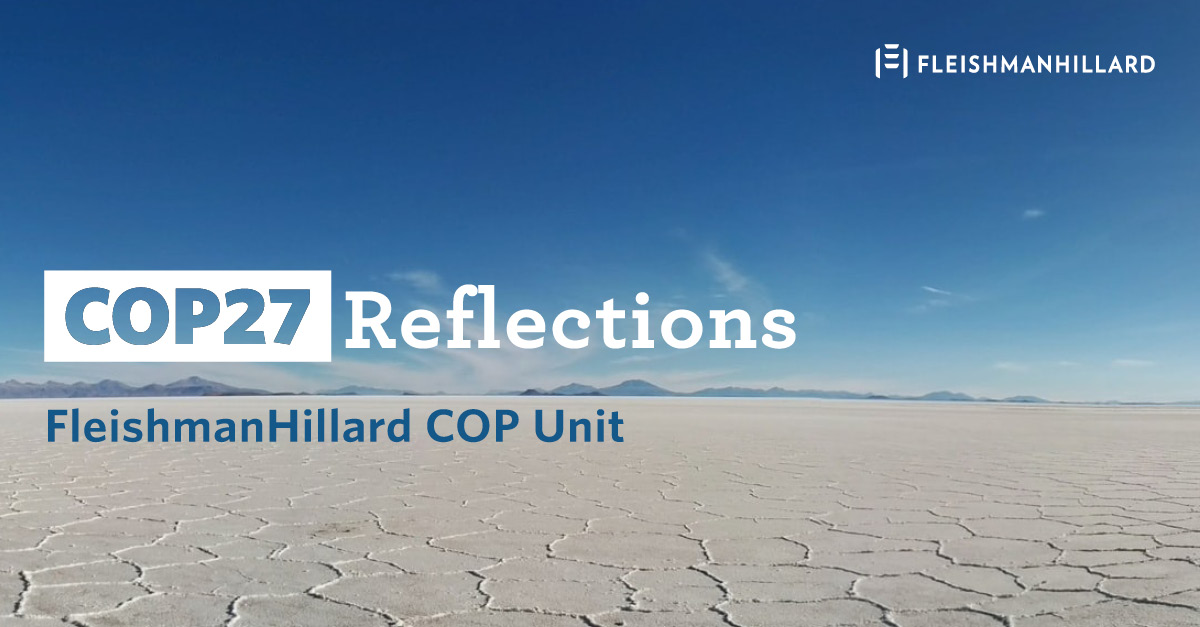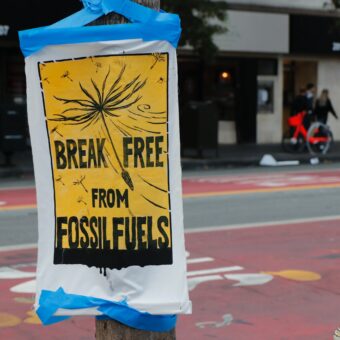COP27 Review: Global action slows despite notable successes

Michael Hartt, Senior Partner and Head of International Affairs
Despite the intense last-minute wrangling as COP27 carried on for two days beyond its scheduled close, the summit yielded little in the way of major breakthroughs.
While the commitment to a loss and damage fund deserves celebrating, the failure to reach agreement in other key areas will likely leave delegates disappointed by the final text and dismayed that the goal of limiting global heating to 1.5C may have slipped away.
Here are six takeaways and lessons from COP27, including their impact upon communications, as the summit concludes and we look ahead in the fight against climate change.
 1. Loss and damage commitment | FleishmanHillard COP27 Review
1. Loss and damage commitment | FleishmanHillard COP27 Review
Establishing a fund to cover loss and damage due to climate change in lower-income, more vulnerable countries will be the legacy of COP27.
Numerous leaders of smaller countries, such as Prime Minister Mia Mottley of Barbados and Climate Change Minister Sherry Rehma of Pakistan, demanded action, put forward in-depth proposals and helped negotiate solutions that will support the countries that have contributed least to the climate crisis but are most affected by high temperatures, extreme weather and rising seas.
The specifics of the loss and damage fund, which earned only measured backing from the United States late in negotiations, now require addressing. This includes how donations will be made, which countries will qualify, and how funds will be dispersed. But even if the devil is in the details, the agreement has the potential to be transformational.
 2. Keeping 1.5C in sight | FleishmanHillard COP27 Review
2. Keeping 1.5C in sight | FleishmanHillard COP27 Review
Scientists and experts are divided over whether COP27 keeps the target of only 1.5C in global heating in sight – and if it gives the world the best chance to hold off catastrophic climate change. Regardless, there is strong agreement that COP27 did not go far enough to cut emissions, including no declaration that emissions must peak in 2025 and decline afterwards. That’s despite discussing action in areas like nature-based solutions, with protection of forests declared a priority for the first time.
Many delegates will leave Sharm El-Sheikh feeling that significantly more in-depth negotiations are needed ahead of COP28 in the UAE – with a sense of urgency not to wait until COP28 itself. Governments and the private sector should expect to hear more about that effort and face pressure for urgent action.
“This is the make-or-break decade, but what we have in front of us is not enough of a step forward for people and planet.”
EU Climate Policy Chief Frans Timmermans
 3. Fossil fuel phase-down failure | FleishmanHillard COP27 Review
3. Fossil fuel phase-down failure | FleishmanHillard COP27 Review
Following the pledge to ‘phase down’ coal usage at COP26, scientists, activists and some governments were calling for a wider commitment to end fossil fuel usage. This includes India, which faced off against nations that resisted language on phase-out or ‘phase down’, and reportedly includes Saudi Arabia, China and several wealthy countries. The final COP27 text makes no mention of it – a major blow to climate efforts.
While COP27 delegates did agree to boost ‘low-emissions energy’, that could cover everything from wind and solar farms to nuclear power to coal-fired power stations fitted with carbon capture and storage technology. It could also include gas power. It comes amidst criticism that having hundreds of delegates connected to fossil fuel companies attending the summit, well above the number at COP26, watered-down ambitions.
 4. Climate finance progress | FleishmanHillard COP27 Review
4. Climate finance progress | FleishmanHillard COP27 Review
Amidst global economic uncertainty and high inflation, progress on climate finance was uncertain heading into the summit. There is an increasing focus on adaptation not just mitigation (where most funds have gone in the past) and COP27 saw consensus that the current financial system is not adequate at providing the funding support to drive the renewable transition, improve energy efficiency, and increase the uptake of zero- or low-emissions technologies. Leaders called on multilateral development banks and international financial institutions to both reform their practices and scale up funding, as part of a new vision to address the climate emergency.
Action on climate finance has the potential to be an economic boost – driving spending into lower and middle-income countries and generating new innovations. While the focus was on the MDBs, private sector financial institutions will also be expected to ramp up their efforts, which will require them in turn to communicate and engage with stakeholders more effectively about their plans and progress. They will do so in the context of contentious discussions about ESG investing.

5. Business – a less vocal but essential partner | FleishmanHillard COP27 Review
After the UK Presidency introduced an unprecedented level of corporate engagement at COP26, many businesses scaled down their presence and engagement at COP27. Although this year’s COP arguably had fewer opportunities for communications and stakeholder engagement outside closed-door negotiations, there remains significant expectation for businesses to take a meaningful role in tackling climate change.
During the summit, the UN published a report to address net-zero commitments by businesses, financial institutions and cities, and called out the need for “zero tolerance for net-zero greenwashing”.
We anticipate companies will be pushed to communicate more transparently and credibly in 2023 and to push for more ambitious commitments at COP28 through public and political channels.
 6. Young people demand the stage | FleishmanHillard COP27 Review
6. Young people demand the stage | FleishmanHillard COP27 Review
COP27’s Youth and Future Generations Day gave young people a more prominent platform than at past summits, and they seized the moment. Powerful stories of the impact of the climate crisis, strong calls to action directed at leaders, and a sense that young people are here to change the world all made an impression, even though climate activist Greta Thunberg declared ahead of COP that space for civil society was limited and the event is a forum for greenwashing.
FleishmanHillard’s ‘The Voice of a Climate Generation’ research has shown that young people expect government and business to do more, and act faster on climate. COP27 showed they will continue to hold leaders’ feet to the fire, and companies should expect that climate issues will only increase as a factor in young people’s minds when deciding to support or purchase from a company. It presents an urgent communications challenge, with companies needing to be transparent, fact-based and authentic in order to avoid criticism.
After two weeks of highs and lows, exhausted delegates and negotiators will leave COP27 knowing that progress in key areas will be offset by gaps in others.
Over the coming days, the FleishmanHillard COP Unit will look ahead to the issues and challenges that will be a priority in 2023 as we head toward COP28 and the ways in which communications will factor in driving further progress.
Find Out More
-
Corporate Affairs Trends for 2026
December 10, 2025


